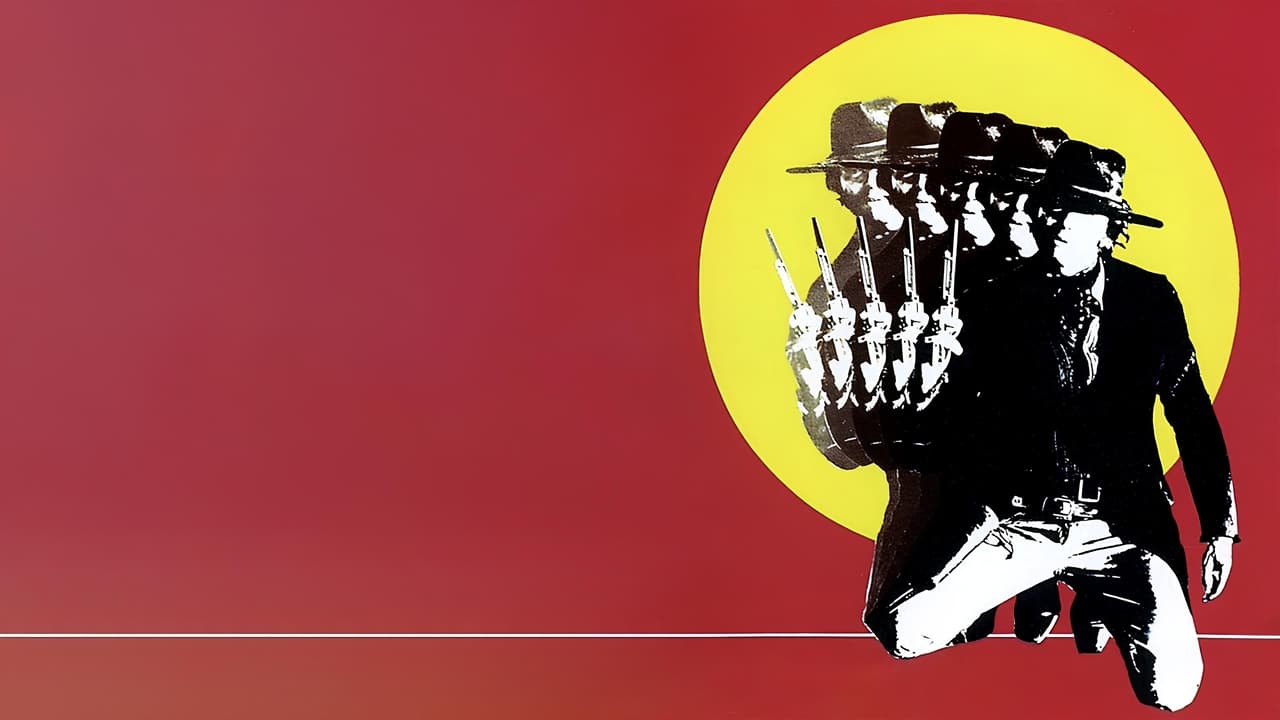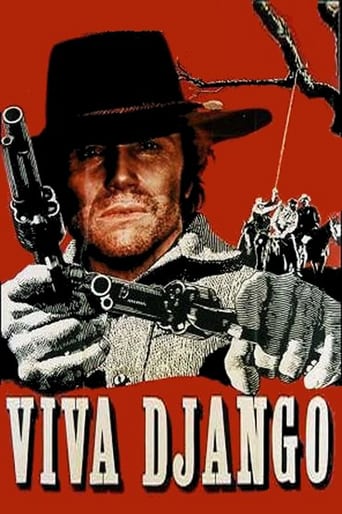ironhorse_iv
Designed to cash in on the success of 1966's Django, this unofficial Django movie directed by Edoardo Mulargia is very unoriginal with its plot. It just carbon copy, the previous film's plot. Instead of stealing gold, like the last movie. Django (Anthony Steffen) in this film, steals guns. Instead of chasing down one man; he's chasing down a team of men, with the help of a horse theft, Carranza (Stelio Candelli) whom can identify the members of the gang that kill his wife. While, a lot of people might think, his wife was raped. Seeing, multiplies copies of the film. I can clearly let this rumor to rest, that she does not. Even with all that, the movie plot is still pretty generic, predictable and tiresome. The funny thing about this film, is how little, the producers seem to have a minimum knowledge of Sergio Corbucci's work on Django. While, the main character in question, does wear black; there is nothing about his character, that makes us, think, he is the same man as the original film. There is no iconic coffin, no tombstones or crosses made for his victims, and most of all, no spooky or dark themes. Unless, you count, the hero hiding behind corpse. This movie seem to recycles more elements of the "Trilogy of the Dollar" by Sergio Leone than Corbucci's film series. For example, the hanging scene, and the music box. The acting is alright for the most part. Anthony Steffen has this unique manner to Django. Steffen looks like he could be the laboratory clone of Henry Fonda. He has that likable and engaging screen main star presence. Stelio Candelli plays up the Tuco-inspired character of Carranza with grinning glee. Both Steffen and Candelli display a winning chemistry in the leads and the movie kinda works, because of them. The only problem is that, the movie seem to lack, a good main villain. Chris Avram as the lethal Jeff and Riccardo Pizzuti as the dastardly Thompson were lackluster. The movie made them, look like idiots, than men that could honestly, be a threat to the heroes. This movie is surprising, very light-hearten. There was tons of funny silly pranks pull against the villains, like the bed or fake arm scenes. Still, there were some tricks that were a little unrealistic. Some good examples are, the scene where he disable most of the shotguns or loosen all the bad guys' sandals. Where did he get time for that? Some scenes seem to have come out of a cartoon, like the one where a guy throws a stick of dynamite in Django, only to have it, backfired, with him half stunned, fuming and with his face and clothes scorched by the blast! Is this, a Looney Toons's episode or a Spaghetti Western!? Anyways, there were some moments that wasn't supposed to be funny, but it just comes across, as hilarious, due to the film, low budget production like the stunt dummy being tossed over the cliff, the over the top, one shot kills or the editors reusing shots like the man jumping through the window, during an explosion. This movie has tons of LOL moments. Note that this film came out in 1971, a time when the spaghetti western tried to reinvent itself by appealing to the comic, burlesque and the absurd, that came from the success of 1970's film, 'They call me, Trinity'. The writers for this movie, was hoping to do the same with this movie, but it didn't mash well, due to some really unusual framing choices. A good example is how they portray saloon owner, Paco (Donato Castellenata). They made him into a great likable supporting character, but also add dark scenes of him, slapping women and being forced to gun fight. WTF! It doesn't know, if it wants to be serious or be a comedy film. In terms, of death toll, this is one of the most violent titles of Django series. 57 out of 90 men are killed by Django. It's really over-blown, seeing that he just wanted to get revenge with four men. While, the movie has plenty of gun fights, none of them were graphic. There were a lot of scenes that go nowhere, like Django eyeing Lola (Esmeralda Barros), while looking at a nude painting. While, the luscious Esmeralda Baldi supplies some really needed eye candy. Her scenes seem a bit wasted in the film, as nothing is establish, between her and the leads. Another framing mistake is how a car shows up out of nowhere. The film never tells us, what year, is the movie event, taking place. So, it look out of place. The dialogue is whack as well. Bartender saying that hanging isn't a Christian way to die, but tells a story about a Native-American saying about souls comes out of the mouth. What? There is some confusion with the movie title as some distributors renamed as "Viva Django", unaware that by that title was also used by director Ferdinando Baldi for his 1968's film, 'Django, Prepare a Coffin". I like the great psychedelic credit sequence with Piero Umiliani's melodic score. It create a perfect musical backdrop to this enjoyably fast-paced, late period spaghetti western. I didn't like the twist ending with that awkward freeze-framing. It made it look like the movie was cut-short. It is curious to note that this film is the last "sotto-Django", in the Golden Age of Spaghetti Westerns. It is very easy to find the movie on the internet. If not, there are plenty of DVDs, worth checking out. Just note, that some versions are not in high quality. There is a 'Django' double feature DVD from Shout Factory/Timeless Media Group features this movie and Sartana's Showdown in the West that is easily high recommendation due to the quite good transfer. Overall: Eduardo Mulargia manages to put together a decent Spaghetti Western. While, this movie didn't outdo the original Franco Nero's film; it was still very entertaining.
FightingWesterner
After his wife is murdered by a gang of cutthroats, Django (Anthony Steffen again) saves one of the gang's ex-associates from a hanging in order to identify the men responsible, finding them caught up in a gun smuggling scheme involving the Mexican revolution.Although it steals ideas from about half a dozen other spaghetti westerns, this fake Django sequel is certainly fast-paced enough, with adequate production values and enough action to fill up it's running time. However, the comic relief is sometimes too pervasive and not very funny either. Way too often, it kills the tension and takes away from Steffen's hard-edged character.Speaking of Django, as a justice/vengeance seeker, he sure is morally dubious here, gunning down a lot of people not responsible for his wife's death, including some men attempting to hang a condemned criminal (What a hypocrite!) and Mexican soldiers that just happen to be around when he kills one of the men that is responsible!The "surprise" ending is fun, though you can see it coming a mile away.

